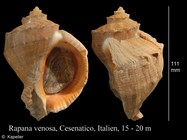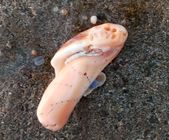BlackSea taxon details
Rapana venosa (Valenciennes, 1846)
140416 (urn:lsid:marinespecies.org:taxname:140416)
accepted
Species
Rapana thomasiana Crosse, 1861 · unaccepted > junior subjective synonym
marine
(of ) Valenciennes A. (1846). Atlas de Zoologie. Mollusques. <em>In: A. du Petit-Thouars, Voyage autour du monde sur la frégate la Venus pendant les années 1836–1839.</em> 4 vols. [Mollusques: pls. 1, 1bis, 2, 2bis, 3, 3bis, 4–24; no text]., available online at https://www.biodiversitylibrary.org/page/54753345
page(s): 22, pl. 7 figs 1,1a. [details]
page(s): 22, pl. 7 figs 1,1a. [details]
MolluscaBase eds. (2021). MolluscaBase. Rapana venosa (Valenciennes, 1846). Accessed through: Sergeyeva, O. (2021) Black Sea checklist for Ocean-Ukraine & Sibema at: http://vliz.be/projects/ocean-ukraine/aphia.php?p=taxdetails&id=140416 on 2025-05-20
Sergeyeva, O. (2025). Black Sea checklist for Ocean-Ukraine & Sibema. Rapana venosa (Valenciennes, 1846). Accessed at: https://vliz.be/projects/ocean-ukraine/aphia.php?p=taxdetails&id=140416 on 2025-05-20
original description
(of Rapana thomasiana Crosse, 1861) Crosse, H. (1861). Description d'espèces nouvelles. <em>Journal de Conchyliologie.</em> 9 (2): 171-176., available online at https://www.biodiversitylibrary.org/page/15608276 [details]
original description (of ) Valenciennes A. (1846). Atlas de Zoologie. Mollusques. <em>In: A. du Petit-Thouars, Voyage autour du monde sur la frégate la Venus pendant les années 1836–1839.</em> 4 vols. [Mollusques: pls. 1, 1bis, 2, 2bis, 3, 3bis, 4–24; no text]., available online at https://www.biodiversitylibrary.org/page/54753345
page(s): 22, pl. 7 figs 1,1a. [details]
context source (Introduced species) Katsanevakis, S.; Bogucarskis, K.; Gatto, F.; Vandekerkhove, J.; Deriu, I.; Cardoso A.S. (2012). Building the European Alien Species Information Network (EASIN): a novel approach for the exploration of distributed alien species data. <em>BioInvasions Records.</em> 1: 235-245., available online at http://easin.jrc.ec.europa.eu [details] Available for editors
basis of record Gofas, S.; Le Renard, J.; Bouchet, P. (2001). Mollusca. in: Costello, M.J. et al. (eds), European Register of Marine Species: a check-list of the marine species in Europe and a bibliography of guides to their identification. <em>Patrimoines Naturels.</em> 50: 180-213., available online at http://www.vliz.be/imisdocs/publications/ocrd/254404.pdf [details]
additional source Kerckhof, F.; Vink, R.J.; Nieweg, D.C.; Post, J.J.N. (2006). [The veined whelk <i>Rapana venosa</i> has reached the North Sea]. <i>Aquatic Invasions 1(1)</i>: 35-37 (look up in IMIS) [details]
additional source Streftaris, N., A. Zenetos & E. Papathanassiou. (2005). Globalisation in marine ecosystems: the story of non-indigenous marine species across European seas. <em>Oceanogry and Marine Biology: an Annual Review.</em> 43: 419-453. (look up in IMIS) [details] Available for editors
additional source Zenetos, A., M.E. Cinar, M.A. Pancucci-Papadopoulou, J.G. Harmelin, G. Furnari, F. Andaloro, N. Bellou, N. Streftaris & H. Zibrowius. (2005). Annotated list of marine alien species in the Mediterranean with records of the worst invasive species. <em>Mediterranean Marine Science.</em> 6 (2): 63-118., available online at https://www.researchgate.net/publication/273213810_Annotated_list_of_marine_alien_species_in_the_Mediterranean_with_records_of_the_worst_invasive_species [details] Available for editors
additional source Occhipinti-Ambrogi, A., A. Marchini, G. Cantone, A. Castelli, C. Chimenz, M. Cormaci, C. Froglia, G. Furnari, M.C. Gambi, G. Giaccone, A. Giangrande, C. Gravil, F. Mastrototaro, C. Mazziotti, L. Orsi-Relini & S. Piraino. (2010). Alien species along the Italian coasts: an overview. <em>Biological Invasions.</em> 13(1): 215-237., available online at https://doi.org/10.1007/s10530-010-9803-y [details] Available for editors
additional source Liu, J.Y. [Ruiyu] (ed.). (2008). Checklist of marine biota of China seas. <em>China Science Press.</em> 1267 pp. (look up in IMIS) [details] Available for editors
additional source Zenetos, A., S. Gofas, M. Verlaque, M. Cinar, J. Garcia Raso, C. Bianchi, C. Morri, E. Azzurro, M. Bilecenoglu, C. Froglia, I. Siokou, D. Violanti, A. Sfriso, G. San Martin, A. Giangrande, T. Katagan, E. Ballesteros, A. Ramos-Espla, F. Mastrototaro, O. Ocana, A. Zingone, M,. Gambi & N. Streftaris. (2010). Alien species in the Mediterranean Sea by 2010. A contribution to the application of European Union's Marine Strategy Framework Directive (MSFD). Part I. Spatial distribution. <em>Mediterranean Marine Science.</em> 11(2): 381-493., available online at https://doi.org/10.12681/mms.87 [details]
additional source Claremont, M., Vermeij, G. J., Williams, S. T. & Reid, D. G. (2013). Global phylogeny and new classification of the Rapaninae (Gastropoda: Muricidae), dominant molluscan predators on tropical rocky seashores. <em>Molecular Phylogenetics and Evolution.</em> 66: 91–102. [Published online 28 September 2012; Code-compliant paper version published January 2013]. [details] Available for editors
additional source Marchini, A., J. Ferrario, A. Sfriso & A. Occhipinti-Ambrogi. (2015). Current status and trends of biological invasions in the Lagoon of Venice, a hotspot of marine NIS introductions in the Mediterranean Sea. <em>Biological Invasions.</em> 17:2943–2962., available online at https://doi.org/10.1007/s10530-015-0922-3 [details] Available for editors
additional source Dağtekin, M. (2023). The invasive mollusk Rapana venosa (Mollusca: Neogastropoda: Muricidae) in the mid-southern Black Sea: Distribution, growth, and stock structure. <em>Acta Ichthyologica et Piscatoria.</em> 53: 191-199., available online at https://aiep.pensoft.net/article/113745/list/8/ [details]
original description (of ) Valenciennes A. (1846). Atlas de Zoologie. Mollusques. <em>In: A. du Petit-Thouars, Voyage autour du monde sur la frégate la Venus pendant les années 1836–1839.</em> 4 vols. [Mollusques: pls. 1, 1bis, 2, 2bis, 3, 3bis, 4–24; no text]., available online at https://www.biodiversitylibrary.org/page/54753345
page(s): 22, pl. 7 figs 1,1a. [details]
context source (Introduced species) Katsanevakis, S.; Bogucarskis, K.; Gatto, F.; Vandekerkhove, J.; Deriu, I.; Cardoso A.S. (2012). Building the European Alien Species Information Network (EASIN): a novel approach for the exploration of distributed alien species data. <em>BioInvasions Records.</em> 1: 235-245., available online at http://easin.jrc.ec.europa.eu [details] Available for editors
basis of record Gofas, S.; Le Renard, J.; Bouchet, P. (2001). Mollusca. in: Costello, M.J. et al. (eds), European Register of Marine Species: a check-list of the marine species in Europe and a bibliography of guides to their identification. <em>Patrimoines Naturels.</em> 50: 180-213., available online at http://www.vliz.be/imisdocs/publications/ocrd/254404.pdf [details]
additional source Kerckhof, F.; Vink, R.J.; Nieweg, D.C.; Post, J.J.N. (2006). [The veined whelk <i>Rapana venosa</i> has reached the North Sea]. <i>Aquatic Invasions 1(1)</i>: 35-37 (look up in IMIS) [details]
additional source Streftaris, N., A. Zenetos & E. Papathanassiou. (2005). Globalisation in marine ecosystems: the story of non-indigenous marine species across European seas. <em>Oceanogry and Marine Biology: an Annual Review.</em> 43: 419-453. (look up in IMIS) [details] Available for editors
additional source Zenetos, A., M.E. Cinar, M.A. Pancucci-Papadopoulou, J.G. Harmelin, G. Furnari, F. Andaloro, N. Bellou, N. Streftaris & H. Zibrowius. (2005). Annotated list of marine alien species in the Mediterranean with records of the worst invasive species. <em>Mediterranean Marine Science.</em> 6 (2): 63-118., available online at https://www.researchgate.net/publication/273213810_Annotated_list_of_marine_alien_species_in_the_Mediterranean_with_records_of_the_worst_invasive_species [details] Available for editors
additional source Occhipinti-Ambrogi, A., A. Marchini, G. Cantone, A. Castelli, C. Chimenz, M. Cormaci, C. Froglia, G. Furnari, M.C. Gambi, G. Giaccone, A. Giangrande, C. Gravil, F. Mastrototaro, C. Mazziotti, L. Orsi-Relini & S. Piraino. (2010). Alien species along the Italian coasts: an overview. <em>Biological Invasions.</em> 13(1): 215-237., available online at https://doi.org/10.1007/s10530-010-9803-y [details] Available for editors
additional source Liu, J.Y. [Ruiyu] (ed.). (2008). Checklist of marine biota of China seas. <em>China Science Press.</em> 1267 pp. (look up in IMIS) [details] Available for editors
additional source Zenetos, A., S. Gofas, M. Verlaque, M. Cinar, J. Garcia Raso, C. Bianchi, C. Morri, E. Azzurro, M. Bilecenoglu, C. Froglia, I. Siokou, D. Violanti, A. Sfriso, G. San Martin, A. Giangrande, T. Katagan, E. Ballesteros, A. Ramos-Espla, F. Mastrototaro, O. Ocana, A. Zingone, M,. Gambi & N. Streftaris. (2010). Alien species in the Mediterranean Sea by 2010. A contribution to the application of European Union's Marine Strategy Framework Directive (MSFD). Part I. Spatial distribution. <em>Mediterranean Marine Science.</em> 11(2): 381-493., available online at https://doi.org/10.12681/mms.87 [details]
additional source Claremont, M., Vermeij, G. J., Williams, S. T. & Reid, D. G. (2013). Global phylogeny and new classification of the Rapaninae (Gastropoda: Muricidae), dominant molluscan predators on tropical rocky seashores. <em>Molecular Phylogenetics and Evolution.</em> 66: 91–102. [Published online 28 September 2012; Code-compliant paper version published January 2013]. [details] Available for editors
additional source Marchini, A., J. Ferrario, A. Sfriso & A. Occhipinti-Ambrogi. (2015). Current status and trends of biological invasions in the Lagoon of Venice, a hotspot of marine NIS introductions in the Mediterranean Sea. <em>Biological Invasions.</em> 17:2943–2962., available online at https://doi.org/10.1007/s10530-015-0922-3 [details] Available for editors
additional source Dağtekin, M. (2023). The invasive mollusk Rapana venosa (Mollusca: Neogastropoda: Muricidae) in the mid-southern Black Sea: Distribution, growth, and stock structure. <em>Acta Ichthyologica et Piscatoria.</em> 53: 191-199., available online at https://aiep.pensoft.net/article/113745/list/8/ [details]
 Present
Present  Inaccurate
Inaccurate  Introduced: alien
Introduced: alien  Containing type locality
Containing type locality
Marine Life Information Network - UK
To Barcode of Life (111 barcodes)
To Biodiversity Heritage Library (12 publications)
To Biodiversity Heritage Library (13 publications) (from synonym Rapana thomasiana Crosse, 1861)
To Biological Information System for Marine Life (BISMaL)
To Conchology (Rapana venosa ATLANTIC)
To Conchology (Rapana venosa EUROPE)
To Conchology (Rapana venosa INDO PACIFIC)
To European Nucleotide Archive, ENA (Rapana venosa)
To GenBank (5629 nucleotides; 255 proteins)
To GenBank (5629 nucleotides; 255 proteins) (from synonym Rapana thomasiana Crosse, 1861)
To Global Biotic Interactions (GloBI)
To Global Invasive Species Database (GISD)
To Information system on Aquatic Non-Indigenous and Cryptogenic Species (AquaNIS)
To Malacopics (Rapana venosa (Valenciennes, 1846) Black Sea, just outside Bosporus, by dredging, a...
To Malacopics (Rapana venosa (Valenciennes, 1846) Bulgaria, Burgas, Dyuni, Marina Beach, alive in ...
To Malacopics (Rapana venosa (Valenciennes, 1846) North Sea, De Reeper, collected 25--.)
To NHMUK collection (Rapana thomasiana Crosse, 1861; HOLOTYPE; NHMUK:ecatalogue:2486968) (from synonym Rapana thomasiana Crosse, 1861)
To NMNH Extant Collection (IZ MOL 890931 Rapana venosa)
To PESI
To PESI (from synonym Rapana thomasiana Crosse, 1861)
To USNM Invertebrate Zoology Mollusca Collection
To Barcode of Life (111 barcodes)
To Biodiversity Heritage Library (12 publications)
To Biodiversity Heritage Library (13 publications) (from synonym Rapana thomasiana Crosse, 1861)
To Biological Information System for Marine Life (BISMaL)
To Conchology (Rapana venosa ATLANTIC)
To Conchology (Rapana venosa EUROPE)
To Conchology (Rapana venosa INDO PACIFIC)
To European Nucleotide Archive, ENA (Rapana venosa)
To GenBank (5629 nucleotides; 255 proteins)
To GenBank (5629 nucleotides; 255 proteins) (from synonym Rapana thomasiana Crosse, 1861)
To Global Biotic Interactions (GloBI)
To Global Invasive Species Database (GISD)
To Information system on Aquatic Non-Indigenous and Cryptogenic Species (AquaNIS)
To Malacopics (Rapana venosa (Valenciennes, 1846) Black Sea, just outside Bosporus, by dredging, a...
To Malacopics (Rapana venosa (Valenciennes, 1846) Bulgaria, Burgas, Dyuni, Marina Beach, alive in ...
To Malacopics (Rapana venosa (Valenciennes, 1846) North Sea, De Reeper, collected 25--.)
To NHMUK collection (Rapana thomasiana Crosse, 1861; HOLOTYPE; NHMUK:ecatalogue:2486968) (from synonym Rapana thomasiana Crosse, 1861)
To NMNH Extant Collection (IZ MOL 890931 Rapana venosa)
To PESI
To PESI (from synonym Rapana thomasiana Crosse, 1861)
To USNM Invertebrate Zoology Mollusca Collection







.jpg)
.jpg)


